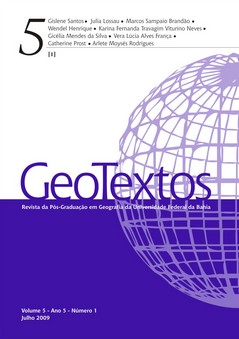EXCHANGE OF KNOWLEDGES FOR A PARTICIPATIVE ENVIRONMENTAL MANAGEMENT
DOI:
https://doi.org/10.9771/1984-5537geo.v5i1.3573Keywords:
Sustentainability, Traditional populations and knowledge, Autonomy, Uusers’ associationAbstract
The globalization in its neoliberal aspect is presented as the unique economic option to reach the development, but a more critical look reveals that is a fable that hides a socially excluding system for a growing majority of the global population and with negative consequences on environment. In front of anti-globalization acts, the capitalism appropriates itself of the environmentalist slogans, but gets only a bit more “green” without questioning the structural roots of the environmental problems. Nevertheless, the progress of the new technologies of information allows to get heard the voice of the excluded, among them, the traditional populations. In the environmental debate, the conservationism is marking points with the official recognition to integrate the traditional populations in policies of environmental protection thanks to their traditional knowledge. The processes of participation should consider the differences of perception of nature by the local populations and promote the autonomy of these ones. In the Bay of Iguape, the extrativist reserve (resex) has a Deliberative Counsel, but this sphere is not adequate for planning and management of natural resources. For this, it is proposed, through the realization of workshops in the area, the creation of an association of users of the resex, tools more adapted to potentialize the power of the users and manage the quotidian life of the resex.Downloads
Downloads
Published
How to Cite
Issue
Section
License
Autores que publicam nesta revista concordam com os seguintes termos:
Autores mantém os direitos autorais e concedem à revista o direito de primeira publicação, com o artigo simultaneamente licenciado sob a Licença Creative Commons Creative Commons CC BY que permite o compartilhamento do trabalho com reconhecimento da autoria e publicação inicial nesta revista. Esta licença permite que outros distribuam, remixem, adaptem e criem a partir do seu trabalho, mesmo para fins comerciais, desde que lhe atribuam o devido crédito pela criação original. É a licença mais flexível de todas as licenças disponíveis. É recomendada para maximizar a disseminação e uso dos materiais licenciados. Ver o resumo da licença em: https://creativecommons.org/licenses/by/4.0/ Ver o texto legal da licença em: https://creativecommons.org/licenses/by/4.0/ Consulte o site do Creative Commons: https://creativecommons.org/licenses/?lang=pt
Autores têm autorização para assumir contratos adicionais separadamente, para distribuição não-exclusiva da versão do trabalho publicada nesta revista (ex.: publicar em repositório institucional ou como capítulo de livro), com reconhecimento de autoria e publicação inicial nesta revista.
Autores têm permissão e são estimulados a publicar e distribuir seu trabalho online (ex.: em repositórios institucionais ou na sua página pessoal) a qualquer ponto antes ou durante o processo editorial, já que isso pode gerar alterações produtivas, bem como aumentar o impacto e a citação do trabalho publicado (Veja O Efeito do Acesso Livre).






